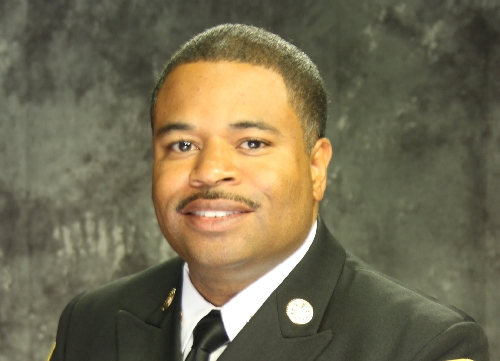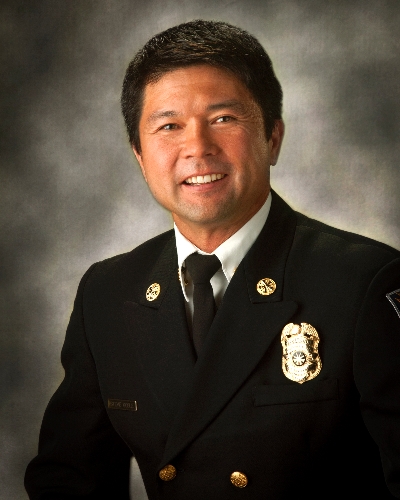CSN fire science program a ladder to success
In 1996, Las Vegas firefighter Bertral Washington and his partner were fighting a losing battle to subdue a multiple-alarm fire in a large commercial building.
The walls leaned. Areas of the roof began to sag. Washington, who had just started to pursue his associate degree in fire science management at the College of Southern Nevada, heard loud cracking noises and knew the building would soon collapse.
"My partner and I backed out to a part of the structure, where, thanks to our education about building construction, a core class in the CSN fire science program, we were safe. We just missed having the building come down on top of us," Washington recalled.
Now chief of the Clark County Fire Department, Washington pushes aspiring and current firefighters to get their degrees as the professionalism of the fire service expands nationwide and college degrees become part of the requirement for advancement.
"We owe our customers excellence. They do not choose which firefighters respond to them in their most critical time of need," Washington said. "CSN is one way that we can continue to learn, work toward excellence and provide the best possible service to our community."
CSN's Fire Science Program Goes Virtual
A number of Southern Nevada's veteran firefighters have come through CSN's fire science program, including Washington and Henderson Fire Chief Steve Goble.
The program is now getting a major face-lift from new director and retired Las Vegas Fire Chief Greg Gammon, who is leading the charge to seek national program accreditation. The achievement demonstrates that CSN's program complies with the highest national standards and speaks to the quality of the degree.
Over the summer, he added 18 new classes that are modeled off of Fire and Emergency Services Higher Education standards.
"Part of my goal is to not only better prepare the younger new hires but to give the incumbent firefighters a chance to get their education here," said Gammon, who came on board at CSN in May.
When he first arrived, Gammon said CSN's program offered no online courses and had a hard time competing with more expensive proprietary institutions that offered distance education degrees that easily accommodate the complex shift schedules of Southern Nevada's six fire departments. Gammon set to work immediately to change that and put the majority of courses online, including the 18 new FESHE courses.
There are still a number of classes that need to be offered on-site, particularly for aspiring firefighters that want to prepare for certifications, he said. Those on-site classes are taking place in the new city of Las Vegas Fire Station 6/CSN Instructional Center that the city built on CSN's Charleston campus. The facility is unique in the nation as the only municipal fire station housed within a classroom building on a college campus and represents the strong partnership between the college and city.
There is also a strong relationship among CSN and each of the six fire departments in Southern Nevada, with whom Gammon has collaborated as he has revamped the program.
Degrees Matter
"I think in most of the departments now, if it comes down to a choice of two candidates and everything is equal, the one who has the degree will most likely get the job," Gammon said. "And if you want to be a battalion chief, deputy chief, assistant chief or fire chief you need to get a bachelor's degree or higher."
Henderson Fire Chief Steve Goble agreed.
In 1990, he applied with 1,500 applicants and was one of 13 to be hired to the Henderson Fire Department.
Four years later, he graduated with his first college degree at CSN in fire science management.
"It built a great foundation in the business management side of the fire department for me," he said. "I was able to get a head start on accounting, budgeting and the human resources side of management. Getting those building blocks in place early and understanding the business side of the fire department was important to my growth."
In addition, experts with first-hand knowledge and personal stories from the field taught classes that helped prepare him to succeed in his career, he said.
Goble went on to receive his bachelor's at Grand Canyon University and is now working on a master's degree. He knows the value of an education.
"I recognized that a degree was going to be important to me and my upward mobility in the fire department," he said.
During his tenure in the Henderson Fire Department, Goble has experienced harrowing fires, rescues and disasters, including the May 6, 1991, massive chlorine liquid leak that created a cloud of gas over the city and required the evacuation of thousands of residents.
He now oversees 209 full-time employees, including 13 chief officers and 185 firefighter-rescue personnel based out of nine stations. His department serves more than 250,000 residents over 100 square miles.
For individuals thinking about a career in fire service today, Goble said he recommends that they obtain their associate degree before applying. In addition, many departments are contemplating requiring an associate degree for advancement.
"The level of commitment and preparedness of candidates today is unbelievable. I don't know that a guy like me would have been competitive," Goble said. "It (a degree) gives you a competitive advantage to get into the fire service and once you are in the fire service it gives you those building blocks to excel."



















